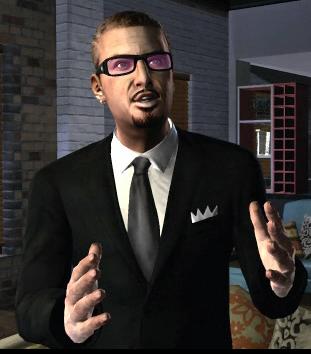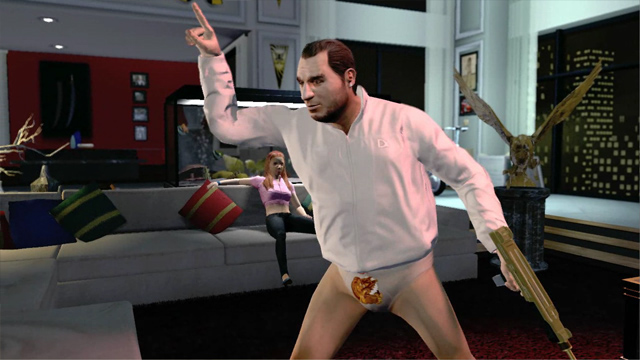Editor's note: Suriel takes issue with how Rockstar implemented Grand Theft Auto's new direction. He's very happy with the serious tone, but he wishes the notoriously brash developer would have committed more fully to its decision. Me? I quit after the second time I shot pool with Roman. -James
 Let me start by saying that I understand that the point of Grand Theft Auto is satire. It skewers the American way of life as well as common misconceptions that people carry about each other. Its parodic talk-radio shows demonstrate the unnatural ability with which hosts monger fear, and the fake-product advertisements between segments are exceptionally keen jabs at America's unique brand of commercialism. Even though the series has moved in a new direction with Grand Theft Auto 4 and its expansions, it continues to possess a certain slyness. Rockstar still has a brazen smirk on its face, and the most important part of its satire is hyperbole.
Let me start by saying that I understand that the point of Grand Theft Auto is satire. It skewers the American way of life as well as common misconceptions that people carry about each other. Its parodic talk-radio shows demonstrate the unnatural ability with which hosts monger fear, and the fake-product advertisements between segments are exceptionally keen jabs at America's unique brand of commercialism. Even though the series has moved in a new direction with Grand Theft Auto 4 and its expansions, it continues to possess a certain slyness. Rockstar still has a brazen smirk on its face, and the most important part of its satire is hyperbole.
Gay Tony is an excellent character. He maintains some of the long-held stereotypes typically associated with gay culture, but overall he is also a very complex guy. Though it is technically the word used to describe him, "gay" does not adequately frame his person. He's a pill addict who is aware that he is in an abusive relationship, but he refuses to leave his boyfriend — even going so far as to say that he enjoys abusive men. He's a complete screw up as a businessman and a master strategist at debt evasion. It is difficult to sum up his relationship with Luis Lopez, the protagonist of The Ballad of Gay Tony, as a master-and-apprentice interchange or a case of clandestine attraction. Equal parts contempt and kinship fuel their friendship.
But here's the problem: Though Rockstar has made good — not great — strides toward overturning some stereotypes surrounding different cultures and races, they've also perpetuated others. While Tony's self-destructive downward spiral has me wrapped up, GTA forces me to fly a helicopter for neo-Sheik stereotype Yusuf, an Arab who misuses his fortune and spouts outdated hip-hop slang.
It would be one thing if Rockstar had chosen to parody every common stereotype, but because they're attempting to create characters that are more human, the people that populate Liberty City play more like tired, off-putting clichés. Women still fill extremely minor roles — Elizabeta and Luis' mother, the only female quest givers in the downloadable episode, are underdeveloped and uninteresting when compared with other members of GTA's eclectic cast.
The expansions could've been a great test to see if fans of the series would connect with a female protagonist, but Rockstar squandered this potential. I enjoyed both The Lost and Damned and The Ballad of Gay Tony, but they missed several opportunities to improve the franchise's storytelling and gameplay. All three of the playable characters in GTA 4 and its subsequent expansions are more or less the same person. They want to rise above their current situation, so they kill people — and Rockstar wants the audience to empathize with them.
What I'm getting at is that Rockstar seems afraid to truly break its own mold even though it desires to do so. Because of their gigantic success, it's possible that Rockstar doesn't want to head in a direction too foreign to stalwart fans of the series. GTA 4's more serious tone garnered enough controversy.
And that's the thing: The wacky and over-the-top characters just don't work with the new formula. Rockstar needs to create characters to match GTA's new direction. If every character were as realistic and nonstereotypical as Gay Tony, the new approach would work much better. At least Rockstar is trying its hand at maturity, but the results vary widely depending on who you talk to. For me, it's exactly what I want to see from the series. In 2010, I can get crazy, open-world rampages in plenty of other places.
 Let me start by saying that I understand that the point of Grand Theft Auto is satire. It skewers the American way of life as well as common misconceptions that people carry about each other. Its parodic talk-radio shows demonstrate the unnatural ability with which hosts monger fear, and the fake-product advertisements between segments are exceptionally keen jabs at America's unique brand of commercialism. Even though the series has moved in a new direction with Grand Theft Auto 4 and its expansions, it continues to possess a certain slyness. Rockstar still has a brazen smirk on its face, and the most important part of its satire is hyperbole.
Let me start by saying that I understand that the point of Grand Theft Auto is satire. It skewers the American way of life as well as common misconceptions that people carry about each other. Its parodic talk-radio shows demonstrate the unnatural ability with which hosts monger fear, and the fake-product advertisements between segments are exceptionally keen jabs at America's unique brand of commercialism. Even though the series has moved in a new direction with Grand Theft Auto 4 and its expansions, it continues to possess a certain slyness. Rockstar still has a brazen smirk on its face, and the most important part of its satire is hyperbole.
